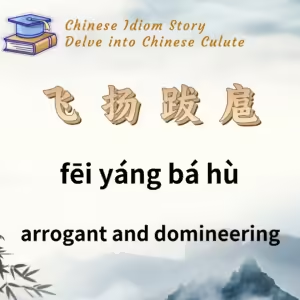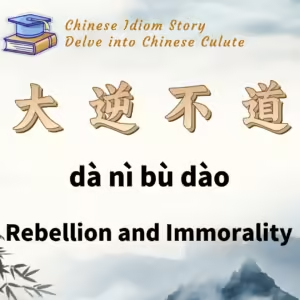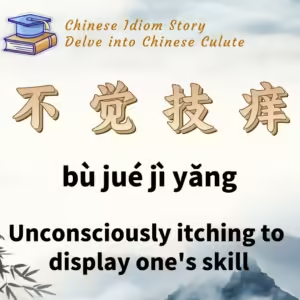
Chinese Idiom: 飞扬跋扈 (Fei Yang Ba Hu)
English Translation: Arrogant and domineering
pīn yīn: fēi yáng bá hù
Idiom Meaning: Originally, this idiom referred to actions that were unconventional and unrestrained. Later, it came to describe someone who is arrogant, domineering, and considers themselves superior to others. “飞扬” (fēi yáng) means “unrestrained,” and “跋扈” (bá hù) means “overbearing.”
Historical Source: Tang Dynasty poet Du Fu’s poem “Zeng Li Bai” (To Li Bai). It is also found in the “Beishi · Qi Gao Zu Ji” (History of the Northern Dynasties · Annals of Emperor Gao of Qi)
Idiom Story
Li Bai, a highly talented poet with a unique personality and a love for alcohol, was known for his exceptional poetic talent and often referred to himself as the “Immortal of the Exiled Fairy” (Qinglian Jushi). Once, while drinking at a tavern in Huzhou (present-day Zhejiang Province), he began singing loudly in a drunken state, oblivious to those around him. The local magistrate heard his singing and sent someone to inquire about him. Li Bai responded with a poem on the spot: “The Immortal of the Exiled Fairy, hiding his name in taverns for thirty springs. Why should the Huzhou magistrate ask? I am the reincarnation of the Golden Grain Buddha.”
In the first year of the Tianbao era (742 AD), Li Bai and the Taoist Wu Jun lived in seclusion in the Shanjin area, upstream of the Cao’e River in present-day Zhejiang. When Wu Jun was summoned to the capital and met Emperor Xuanzong, he took the opportunity to recommend Li Bai. Additionally, Princess Yuzhen, Emperor Xuanzong’s sister who had become a Taoist nun, was a longtime admirer of Li Bai’s poetry and supported his appointment. Consequently, Emperor Xuanzong summoned Li Bai to the capital three times.
Believing this to be an opportunity to fulfill his political aspirations, Li Bai left his family and arrived in Chang’an with great joy. Upon his arrival, he received special treatment from Emperor Xuanzong, who appointed him as an official in the Hanlin Academy. During their meetings, Emperor Xuanzong personally greeted him and frequently consulted him on state matters, asking him to draft edicts. However, Li Bai’s time in Chang’an was short-lived. Due to slander from those close to Emperor Xuanzong, such as Yang Guifei, he felt he could no longer remain at court and resigned, returning to a life of wandering.
In 744 AD, Li Bai left Chang’an for Luoyang, where he met Du Fu. At the time, Du Fu was 33 years old, and Li Bai was 11 years his senior. The two poets became close friends, traveling, drinking, and composing poetry together. They visited several places, including Liang (present-day Kaifeng, Henan), Song (present-day Shangqiu, Henan), and Qi (present-day Jinan, Shandong). That autumn, Du Fu wrote a seven-character quatrain titled “To Li Bai,” reflecting their feelings of frustration and helplessness at being unable to achieve their ambitions, leading them to spend their days drinking and singing. The poem reads:
秋来相顾尚飘蓬,未就丹砂愧葛洪。
痛饮狂歌空度日,飞扬跋扈为谁雄。
The poem’s meaning is: “Autumn has come, and we are still wandering like tumbleweeds. Li Bai, you haven’t succeeded in making the elixir of immortality, which must disappoint the alchemist master Ge Hong. We spend our days drinking and singing aimlessly. For whom are we being so unrestrained and arrogant?”
This phrase “飞扬跋扈为谁雄” (fēi yáng bá hù wéi shuí xióng) was later simplified to the idiom “飞扬跋扈” (fēi yáng bá hù), describing someone who is arrogant and domineering.






